E. coli at swim site '20 times minimum standards'
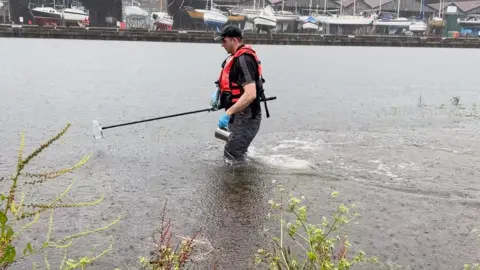 BBC
BBCVery high levels of pollution have been recorded at a site where hundreds of people are due to take part in an annual 10km (6.2 miles) swim.
In one test by the Environment Agency (EA) at Steamer Quay at Totnes, Devon, E. coli pollution was more than 20 times minimum standards and water quality was poor in nine out of the first 10 tests this year.
Steamer Quay, where the Dart 10K swim is due to be held on 7 and 8 September, is one of 27 new designated bathing sites in England, including five in Devon.
Dart 10K organisers Level Water said the event had "never had an outbreak of illness" and South West Water (SWW) said improvements were planned at all storm water overflows affecting Steamer Quay.
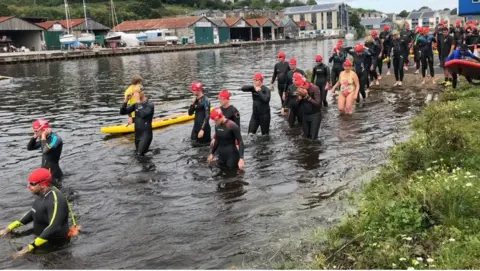
Designated bathing site status means the site is an officially recognised swimming spot and gets weekly tests by the EA from May to September.
The agency tests for faecal matter, which can come from many sources, including sewage from storm water overflows, livestock, wildlife, birds and road drainage.
Results are graded excellent, good, sufficient - where results met minimum standards - and poor.
Results at Steamer Quay showed poor levels of faecal indicator, the bacteria E. coli, on nine out of the first 10 readings since May.
In one test on 6 July, levels hit more than 20 times minimum standards.
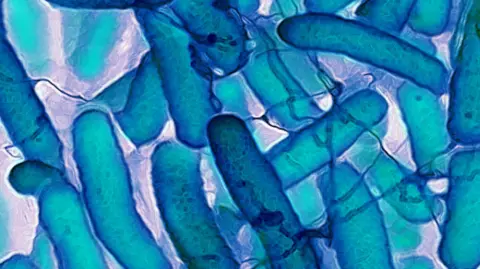 SPL
SPLThe more E. coli in bathing water, the "greater risks to bathers' health", says the Environment Agency.
The UK Health Security Agency said some types of E. coli could cause severe illness and it had produced guidance for open water swimmers.
The Outdoor Swimming Society, which also gives advice on designated bathing waters, said if one was classified as poor "this doesn’t mean you can’t swim" but "there might be an increased risk of getting ill".
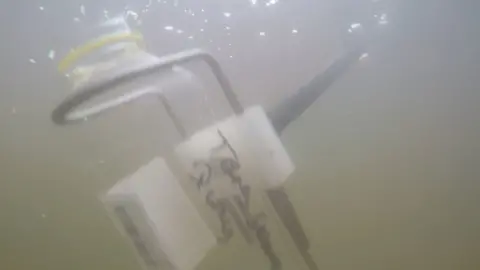
"I swim every day and this isn't a location I would choose to swim," said Hannah Pearson, director and founder of Friends of the Dart, which campaigned for designation.
"But many do, as well as canoeists and paddleboarders, which is why it was important to designate this site."
The friends "frequently" had reports of illness, some serious, from swimming in the Dart, she said.
"If people are informed in an accurate way, we can make decisions collaboratively to resolve these problems," she added.
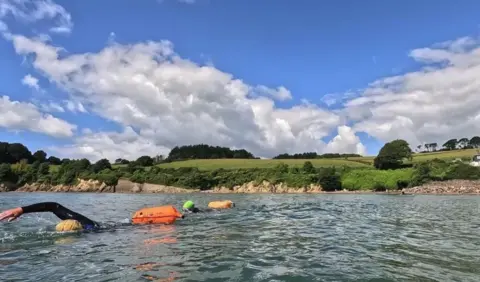 Emily Woodley
Emily WoodleyFurther down the swim route at Stoke Gabriel, pollution levels were poor twice in the first 10 tests.
At Dittisham, where the event ends, there were no poor results.
Tests have also been taking place further down the river at Warfleet, near Dartmouth, where pollution levels were poor once over the same period.
Pollution levels were poor twice at Coastguards Beach on the River Erme.
 South West Water
South West WaterAbout 1,600 swimmers are expected in the Dart 10K which had "never had an outbreak of illness" since the charity event started in 2010, said Level Water.
"Water quality and personal tolerance to impurities both vary, and the decision to swim on any given day is a personal responsibility," it said.
"The test results are disappointing and we hope to see improvement quickly.
"Amongst other measures, we recommend that swimmers cover cuts before the swim and wash their hands with soap after the swim."
Bruce Newport, area environment manager of the Environment Agency, said the river was in "relatively good shape" as a whole.
He said the data produced by the new testing would better inform SWW and farmers about problem areas.
"Then we will be able to make sure the investment we asked for is being put in the right place," he said.
"After heavy rain, there is a risk of elevated levels. So we say, after heavy rain, choose a beach where you don't have the influence of a river," he said.

Canoeist Kerri Adams said she had heard in the previous weeks about the water quality tests at Steamer Quay.
"It's nice to see because, hopefully, there will be big changes," she said.
"Water pollution is a massive issue and we want to see some action."
'Serious about overflows'
SWW said it would be investigating factors affecting water quality "to see what further investment may be required".
"There are a wide range of factors which can affect river water quality, including agricultural and urban pollution," said a spokesperson.
"We recognise that to improve the quality of our rivers, we all need to play our part.
"We are serious about tackling storm overflows and change of this scale takes time, ambition and increased investment, and that is why we are investing £850m in our region over two years."
It added: "Following its designation, we have improvements planned at all of the storm overflows which have the potential to impact bathing water quality at Steamer Quay."
SWW produces live a map showing beaches which may be affected by storm water overflows as well as another map showing which overflows are active.
An overall grading, from excellent through to poor, for all bathing sites is expected to be published in November by Department for Environment, Food & Rural Affairs (Defra).
Follow BBC Devon on X (formerly Twitter), Facebook and Instagram. Send your story ideas to [email protected].
